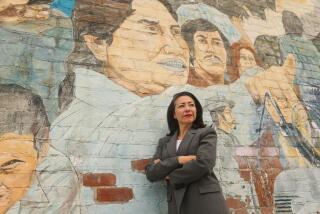THE HILL WILLIAMS SAGA : Williams Kept Low Profile, Colleagues Say
When Anaheim City Councilman William D. Ehrle met Donald Hill Williams Jr. in 1987, the conversation focused on ethics, values and the role of churches in Southern California.
At the time, Williams and other members of the Church of Jesus Christ of Latter-day Saints were lobbying Anaheim council members for support of a church they hoped to build in Anaheim--a church that was, in fact, built and that Williams later attended.
That initial encounter led to a strong personal and business relationship between Williams and Ehrle. “Don came to become what I would consider one of my strong supporters,” said Ehrle, who subsequently worked for Williams’ Anaheim-based development company as a consultant and full-time public affairs director.
Ehrle, who lost his reelection bid last November, expressed shock at Hill Williams’ rapid descent earlier this year into bankruptcy proceedings. Ehrle and a number of other employees were let go by the troubled company in early January, before word of its financial woes spread to investors.
“He was a friendly and concerned person when it came to investors and employees,” Ehrle said. “He wanted to make things happen for his investors, that’s true, but he was not at any time trying to put on a scam.”
Ehrle and others who know Williams from business dealings said that religion played a major role in shaping the developer’s personality.
Bob Roberts, a Redlands real estate broker who met Williams in the early 1980s, described him as a “deeply religious person” who kept several copies of the Book of Morman available at his office for visitors to read.
Roberts and others who knew Williams in Redlands during the late 1970s and early 1980s agree, too, that he was a born salesman.
“He was a personable person, very outgoing, erudite,” said Marie Hanson, whose first real estate job was in a Redlands residential sales office that Williams managed. “I was a total rookie, and he gave me pretty good training. He was a nice person to work for . . . very supportive.”
Not all Redlands real estate agents took the same view of Williams.
“On the surface he was a charming person, but he could buffalo you to all heck,” said Marilyn Campbell, a Redlands real estate agent whom Williams once approached, supposedly for help in arranging a real estate deal.
Campbell said that Williams “picked my brain for all it was worth, and I, being naive at the time, told him everything. He more or less promised I’d work (the deal), but it turns out he had had his brother lined up for the deal all along.”
Though Williams has done business in Anaheim for at least a decade--and has made some substantial contributions to the local Republican Party--the developer maintained a relatively low profile. Hill described himself as a loyal Republican, but GOP activist and fund-raiser Roger Schnapp said that he never met Williams.
Local GOP leaders also were surprised to learn that Williams and his company last March donated $35,000 to the national GOP. “Believe me, if someone had that kind of money for the local party, I’d remember,” Schnapp said.
Similarly, Hill Williams did business in Anaheim for more than a decade but didn’t join the Anaheim Chamber of Commerce until 1992. Even then, Williams never became personally involved in the organization, a chamber spokesman said.
In documents circulated among potential investors, Williams described himself as an active board member of the Boy Scouts and the Ettie Lee Homes for Youth, a Baldwin Park facility for troubled children and teens. But the Scouts have no record of Williams having served as a board member, a spokesman said. And Williams ended his role as an active board member at Ettie Lee Homes more than a year ago because of business demands, Ettie Lee spokeswoman Penny Nelson said.
Ehrle suggested that Williams’ religious ties explain why the developer had such a low profile in the business community. “I think he was mostly close to people within his church,” Ehrle said.
Bil Jeppson, a bishop in the Mormon Church, said he hasn’t talked to Williams in several years but recalls the developer as “a very charismatic guy, to say the least. . . . People found it very comfortable to be around him. He made friends easily.”
Williams was a member of Jeppson’s congregation during the late 1980s. The bishop lost track of the developer, he said, after Williams moved to Newport Beach from Anaheim several years ago.
Earl Garrett, chairman of Ettie Lee Homes, said Williams was “a warm person. . . . I can say that if you met him, you’d like him.”
Garrett said he never knew much about Williams’ social life. While the developer did volunteer work for the home, “I was not close enough to him to even know his wife,” he said.
Garrett, a Hill Williams investor who described Williams as “a very sharp guy,” doubts that the developer set out to defraud investors. “I guess he got himself hung up to dry by overexpanding too fast,” Garrett said. “If he did anything wrong, it was probably the result of him trying to protect his (investors).”
More to Read
Sign up for Essential California
The most important California stories and recommendations in your inbox every morning.
You may occasionally receive promotional content from the Los Angeles Times.










